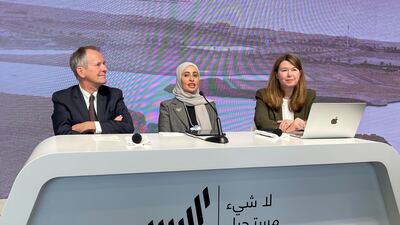The UAE announced in Davos on Tuesday the launch of an index to help business leaders and policymakers track disruptive trends and transformations and find opportunities to boost economic growth.
The Future Possibilities Index, which will also include a survey of executives in 70 countries, builds on the 2020 Future Possibilities Report, commissioned by the UAE government, which identified half a dozen trends — from circular and “experience” economies to biomaterials and big data — that will advance the UN's 2030 Agenda for Sustainable Development.
The UAE, which will not be part of the process for producing the index, aims “to make this index a major flagship index in Davos during the annual meetings of the World Economic Forum, and an important global source for governments and decision-makers to inspire forward-looking policies and strategies”, said Ohood Al Roumi, Minister of State for Government Development and the Future.
At the UAE's Pavilion on the main Promenade in Davos, Switzerland, the minister signed a preliminary partnership agreement with Newsweek’s Vantage research and analysis division and global experts Horizon Group.
“In this era, we are witnessing a wave of new trends shaping unique opportunities that could benefit future generations. It is up to us to make the best out of these emerging disruptions and transformations to design a better future,” said Ms Al Roumi.
The UAE will have a role on the advisory board for the index.
Margareta Drzeniek, managing partner with Horizon Group, which helped compile the UN backed report the UAE released three years ago, said decision makers would need data to be able to assess the six areas of opportunity for growth that the index would measure.



























































These are transformative trends such as “the new digital economy, for example, AI, quantum computing … the transition to net zero … health and well-being … the experience economy, which describes the move away from consuming goods towards experiences, including tourism, but also learning opportunities. And last but not least, a circular economy,” she said.
The index will track the readiness of countries with regards to the above areas, in both the private and public sectors and including if they have the necessary infrastructure in place, Ms Drzeniek said. This would give investors and companies an assessment of where the best opportunities might be.
The 2020 report said there could be as much as a $30 trillion (Dh110 trillion) boost for the global economy by 2025 if governments were able to take advantage of an influx of data, cutting-edge technology and new consumer preferences.
“From the country perspective, it gives them a sense where they are in the process, what they need to do because all those transformations are going to be defining the economy of the future,” she said.
The index would also help countries choose which areas to focus on and prioritise “based on where they have the strengths … also it helps them to see what they need to improve”, Ms Drzeniek said.
“They can benchmark themselves against other countries … and where also the opportunities for leapfrogging are [and find] short-term opportunities.”
The index could also help promote dialogue “that will be more open-minded, and more inclusive of the different groups around the world, north and south, east and west, the younger generation and the older generation,” said Nigel Holloway, chief executive of Newsweek Vantage.

